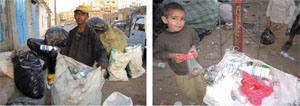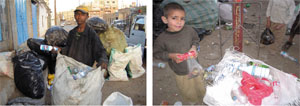
Desperate neighborhood residents collect scrap metal for income [Archives:2008/1136/Last Page]
March 10 2008
 |
In Al-Mu'almeen neighborhood, one of the poorest sections of Aser district, a majority of residents work as can collectors, according to neighborhood sheikh, Mohammed Dahan Al-Sa'eedi.
Many of Al-Mu'almeen's population of approximately 6,000 collect cans and other metal odds and ends as their main source of income.
Residents collect cans, plastic and wire in the area and then sell their finds to junk shops, which don't buy electrical or phone cables – only iron, plastic and other miscellanea. These shops then use a pressurizing instrument to compact the items and resell them to factories in Yemen or overseas for recycling.
According to Fadhl Muqbal Mansour, general director of foreign trade at the Ministry of Industry and Trade, there are no specific statistics regarding the number of people supporting themselves by collecting cans. However, according to some authorities, as many as 90,000 in Yemen are working as can collectors.
Both age 75, Hussein Mohammed Nasser and his wife Saood Ali Gaseem, along with seven other family members – including his divorced daughter and her baby – all live together in one room. His daily income of YR 80 comes only from collecting cans.
Junk shop owner Ahmed Abdullah Mohammed, 45, says selling metal sundries is a good way to earn an income. He has more than 70 clients every day – old, young, men and women – coming to him to sell recyclable trash.
“This simple career covers the expenses of five families: those of my brother and sister, both of whom died, both of my married sons' families, as well as my own family,” Mohammed explains, noting that his store pays YR 30 for a kilo of water bottles and YR 1,000 for a kilo of copper wire.
Neighborhood children say they spend more than four hours each day searching for cans discarded nearby.
Jalal Najee Al-Salmi, 11, who earns YR 40 per day, says he works to cover his school expenses, as well as to buy staples like flour, oil, tea and sugar for his family.
Waleed Mohammed Hizam, 13, spends his YR 30 per day earned from selling recyclable trash to buy sweets.
Yousef Abdulrahman, 7, gives his YR 60 per day to his mother to cover daily expenses.
Ali Suleiman Hassan, 10, earns approximately YR 500 to YR 600 per day from collecting various odds and ends.
According to the Ministry of Industry and Trade, copper is exported because there are no facilities in Yemen for reusing it. However, iron and metal sundries remain in-country and go to Yemeni factories for recycling.
Mansour says the Ministry of Industry and Trade discussed this issue at a meeting last week and plans to appoint a committee to study the sundries-selling field to determine the number of workers, the type of metal, the capacity of factories and the economic effects.
“With the exception of iron, recyclables are exported to China and the Gulf nations,” he explained, “Additionally, old cotton and woolen clothing also are exported [for recycling] because there are no factories here in Yemen.”
Every ton of sundries sold to Yemeni factories is valued between YR 27,000 and YR 30,000.
“Nowadays, collected items are going to specialized Yemeni factories, including two companies in Aden,” Mansour noted, adding, “Buying iron and metal sundries from shops and junkyards is a great investment project.”
——
[archive-e:1136-v:18-y:2008-d:2008-03-10-p:lastpage]


